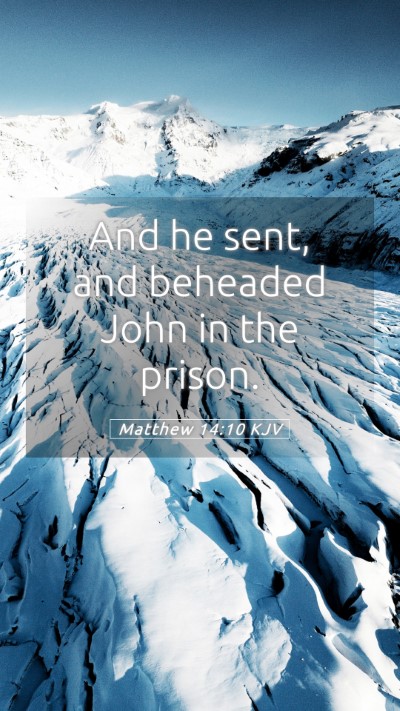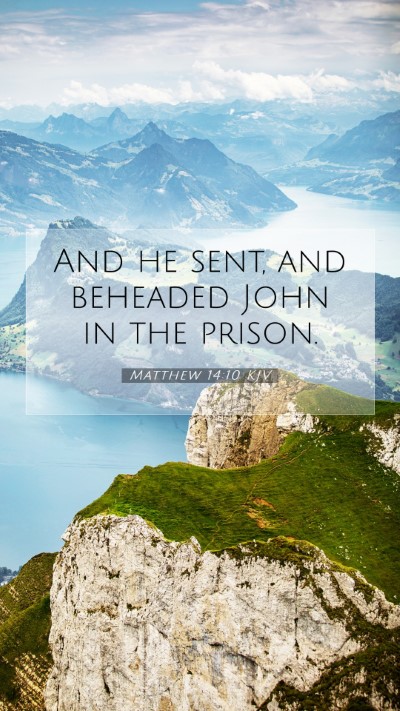Understanding Matthew 14:10
Bible Verse: Matthew 14:10 - "He sent and beheaded John in the prison."
In this passage, we find a pivotal moment reflecting the harsh realities of political and spiritual strife in the time of Jesus. This verse captures the tragic end of John the Baptist, a key figure who prepared the way for Christ's ministry. His beheading serves as a sobering reminder of the consequences faced by those who speak out against injustice and immorality.
Key Themes and Insights
- The Prophetic Voice: John's role as a prophet was to call out sin and herald the coming Messiah. His fearless proclamation of truth, particularly regarding Herod's unlawful marriage, highlights the cost of discipleship and standing for righteousness (Matthew Henry).
- The Influence of Power: Herod's actions were influenced greatly by his fear of public opinion and the whims of those around him. This demonstrates how leaders may often act against their better judgment under peer pressure or fear of losing power (Albert Barnes).
- The Reality of Martyrdom: John's beheading symbolizes the ultimate sacrifice for one's faith. It serves as a stark reminder of the dangers faced by prophets and believers, often struggling against powerful political and social norms (Adam Clarke).
- Judgment and Justice: This act signifies a severe judgment against John, but it also foreshadows the ultimate justice that will come through Christ, reinforcing the idea that God sees and will vindicate His prophets (Matthew Henry).
Historical Context
Understanding the historical background of this event is crucial for interpreting its significance. John the Baptist was known for his boldness in calling out Herod Antipas for marrying Herodias, his brother's wife. Traditionally, this scandalous marriage was seen as unlawful according to Jewish law. The tension between John and Herod set the stage for conflict, leading to John's imprisonment and eventual execution. This incident also showcases the tumultuous relationship between the religious authorities and the ruling power of the time.
Application of Scripture
In applying this scripture, one must reflect on the call to stand firm in truth, regardless of the potential personal costs. John's example encourages believers to remain steadfast in their convictions and to embody courage in the face of persecution or societal pressures. It also serves as a reminder of the spiritual battle that exists, where standing for truth can lead to significant trials.
Cross References
- Matthew 14:1-2: Introduction to Herod's perception of Jesus and the fear born from his guilt over John's death.
- Mark 6:17-29: A detailed account of John's imprisonment and execution.
- Luke 9:9: Herod's inquiries about Jesus, suggesting guilt and curiosity about the man who carried on John's legacy.
- Acts 12:1-2: Herod's further actions against the apostles, illustrating an ongoing theme of persecution for righteous living.
Conclusion
Matthew 14:10 serves as a cry from history that resonates through the ages. It urges contemporary believers to remain vigilant and true to their faith, inspiring strength in adversity. By examining this verse closely through various commentary lenses, one gains deeper insights into the cost of discipleship, the impacts of power, and the unwavering call to speak truth in love.
For those seeking a clear understanding of **Bible verse meanings**, **Bible verse interpretations**, and **Bible study insights**, reflecting on John the Baptist's legacy and the implications of his martyrdom is essential for grasping the complexities of faith and courage in challenging circumstances.


